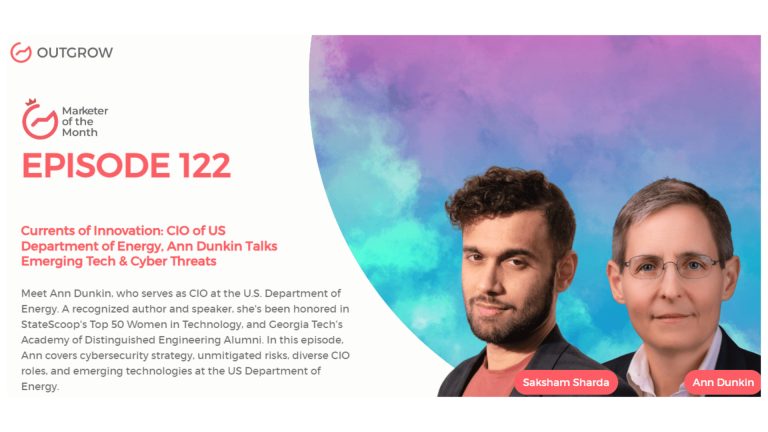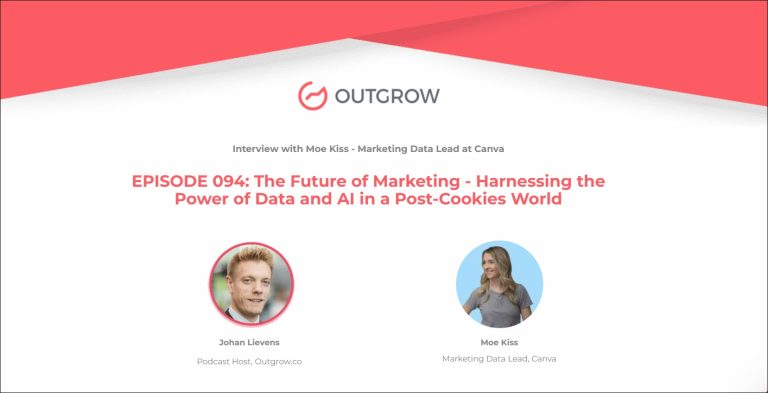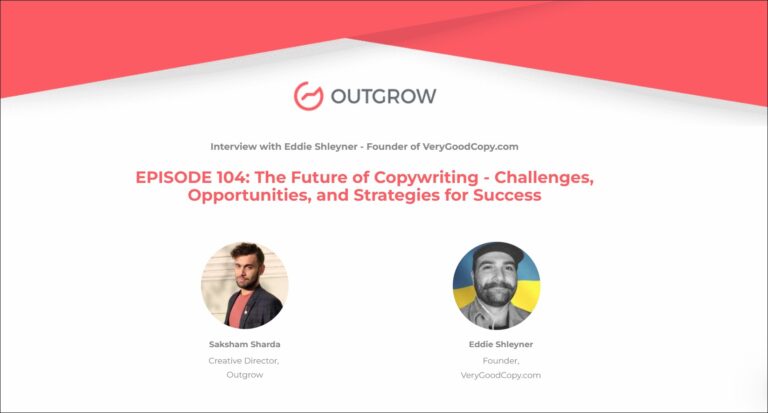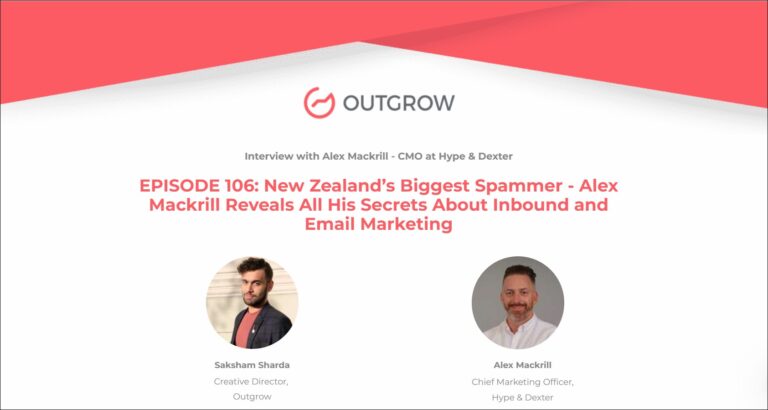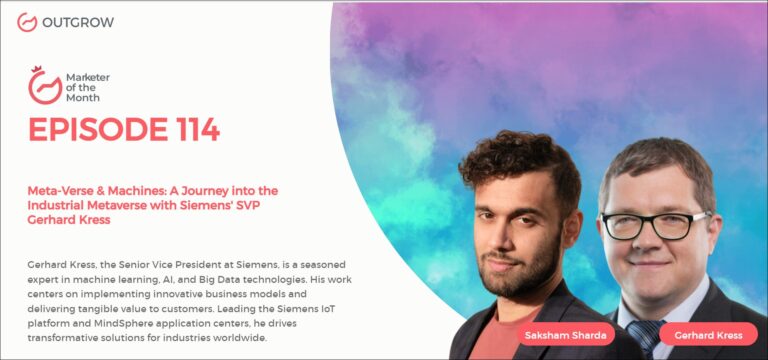Summarize with :
EPISODE 207: Marketer of the Month Podcast with Daniel Flowe
Table of Contents
Hey there! Welcome to the Marketer Of The Month blog!
We recently interviewed Daniel Flowe for our monthly podcast – ‘Marketer of the Month’! We had some amazing insightful conversations with Daniel and here’s what we discussed about –
1. Financial crime and fraud are heavily linked to identity verification failures.
2. Generative AI poses threats; need for new methods to verify authenticity.
3. Importance of verifying beneficial ownership to combat shell company misuse.
4. Enhancing security and user experience by giving control back to individuals.
5. Shift from direct selling to engaging customer-focused content creation.
6. Identity verification spans the entire customer lifecycle, not just initial onboarding.
7. Ensuring compliance while focusing on enhancing customer satisfaction and growth.
About our host:
Dr. Saksham Sharda is the Chief Information Officer at Outgrow.co. He specializes in data collection, analysis, filtering, and transfer by means of widgets and applets. Interactive, cultural, and trending widgets designed by him have been featured on TrendHunter, Alibaba, ProductHunt, New York Marketing Association, FactoryBerlin, Digimarcon Silicon Valley, and at The European Affiliate Summit.
About our guest:
Daniel Flowe is a Technology Evangelist specializing in Identity, Onboarding, and Compliance, and a dedicated DEI Advocate. He leads Digital Identity initiatives at the London Stock Exchange Group (LSEG) in Raleigh, North Carolina. With over four years at LSEG, Daniel has progressed through various roles, contributing significantly to the company’s digital identity strategy.
Identity Crisis: London Stock Exchange Group’s Head of Digital Identity Daniel Flowe on Digital Market Fraud
The Intro!
Saksham Sharda: Hi, everyone. Welcome to another episode of Outgrow’s Marketer of the Month. I’m your host, Dr. Saksham Sharda, and I’m the creative director at Outgrow. co. And for this month we are going to interview Daniel Flowe, who is the Head of Digital Identity at the London Stock Exchange Group.
Daniel Flowe: Great to be here. Thank you.
Don’t have time to read? No problem, just watch the Podcast!
Challenge yourself with this trivia about the exciting topics Daniel Flowe covered in the podcast.
Or you can just listen to it on Spotify!
The Rapid Fire Round!
Saksham Sharda: All right, let’s start with the rapid-fire rounds. At what age do you want to retire?
Daniel Flowe: Gosh, I don’t know that I ever want to retire.
Saksham Sharda: How long does it take you to get ready in the mornings?
Daniel Flowe: 15 minutes.
Saksham Sharda: Most embarrassing moment of your life.
Daniel Flowe: That’s too many to choose from.
Saksham Sharda: Favorite color?
Daniel Flowe: Red.
Saksham Sharda: What time of day are you most inspired?
Daniel Flowe: Early in the morning.
Saksham Sharda: How many hours of sleep can you survive on?
Daniel Flowe: Five.
Saksham Sharda: Fill in the blank. An upcoming finance trend is _____.
Daniel Flowe: An upcoming finance trend is a portable identity.
Saksham Sharda: The city in which the best kiss of your life happened?
Daniel Flowe: San Jose, Puerto Rico.
Saksham Sharda: Pick one. Mark Zuckerberg or Elon Musk.
Daniel Flowe: Neither.
Saksham Sharda: The biggest mistake of your career?
Daniel Flowe: Not believing in myself.
Saksham Sharda: How do you relax?
Daniel Flowe: Exercise.
Saksham Sharda: How many cups of coffee do you drink per day?
Daniel Flowe: Way too many.
Saksham Sharda: A habit of yours that you hate?
Daniel Flowe: I drink way too much coffee.
Saksham Sharda: The most valuable skill you’ve learned in life.
Daniel Flowe: Patience.
Saksham Sharda: Your favorite Netflix show.
Daniel Flowe: Three Body problem.
Saksham Sharda: One-word description of your leadership style.
Daniel Flowe: Servant.
Saksham Sharda: The top priority in your daily schedule.
Daniel Flowe: Prioritization.
Saksham Sharda: An ideal vacation spot for relaxation.
Daniel Flowe: Belize.
Saksham Sharda: A key factor for maintaining a work-life balance?
Daniel Flowe: For the sake. The concept of work-life balance.
Saksham Sharda: Memorable career milestone.
Daniel Flowe: My first startup acquisition.
The Big Questions!
Saksham Sharda: Alright. That’s the end of the rabbit fire round. Okay. How can we go onto the bigger questions, which you can answer with as much time, ease, and length as you’d like? The first one is in January, FinCEN released a highly anticipated report on the state of identity-related suspicious activity. You took the opportunity to analyze the findings; what were the key takeaways regarding the state of identity verification?
Daniel Flowe: Verification, and I’ll start by praising FI for putting that FDA together and doing that research. I love data and I love the willingness of an agency to take a year’s worth of data to crunch the numbers, find the trends, and release a detailed analysis on it. I think that it’s just so good for the industry and so good for everyone. So I love that the government agencies are willing to have that type of transparency and do that type of analysis. So I think the biggest takeaway from it is the vast amount of financial crime and fraud that’s ultimately linked to identity on the front end. So one of the things that I think makes common sense when you think about it is that if you’re gonna commit a crime or you’re going to defraud someone, almost always, you need to be anonymous to make that happen. And if you can accurately and repeatedly resolve the identity of both parties in a transaction it makes it really hard to commit crimes or to defraud other people because there’s accountability and there’s true knowledge of the individual. And what we got out of that FTA was that of all the Bank Secrecy Act reports, the suspicious activity reports that were created in 2021, almost half of them were rooted in some type of failure to accurately resolve identity. So I think the biggest takeaway from that whole document was that it’s a pernicious problem. That identity is much further reaching than most people think, and this huge amount of crime and fraud and other things that are just so detrimental to all of society are ultimately linked back to the failure to accurately identify the individuals involved in the beginning.
Saksham Sharda: And so, how is LSEG then responding to these challenges that have been identified in the report?
Daniel Flowe: Well, I think we’re continuing to invest heavily in digital identity. So in 2022, LSEG bought a company called GDC or Global Data Consortium. And, a few of us came into the Lending Stock Exchange group. Through that acquisition we’ve also continued to invest and acquire a few other others in the space. Our goal is to create an inclusive frictionless, consumer-friendly means to compliantly identify identities. So we’ve invested really heavily in working with data sources all around the world and in working with electronic identity providers. So that’s really our next focus is working with government-issued, bank-issued, and other types of electronic IDs. Because we believe in the safety and security of our financial infrastructure, right? We need to understand and identify all the individuals involved in transactions. But by the same token, we think that everyone globally has the right to be identified. So the World Bank published a report that is about the state of identity. And they currently say that there are around 850 million people around the globe that don’t have a formal identity. They don’t have government-issued documents, they don’t have an identity number. Many of them don’t have formal birth dates. So when we talk about protecting our financial infrastructure and using identity as that sort of key piece of crime prevention and fraud prevention, what we can’t do is leave out the 850 million people enrolled who don’t have an identity, and then the countless others that are recent immigrants that are fleeing from some type of persecution or some type of hardship in their home country. So as we start looking at the global look at identity our key priorities are to protect that financial infrastructure and be, you know, be a good servant, be a good citizen in our world, but also to make sure that we are including all of those people in the world who don’t necessarily have a passport or an identity document or a readily available way to verify who they’re.
Saksham Sharda: But how about AI and identity? You published an article “2024: The Year AI Breaks Content-based IDV?” which suggests significant advancements in AI for identity verification. What are the most promising AI technologies in this space?
Daniel Flowe: So, I think the key when you look at generative AI for identity verification, in some ways it’s most frequently used is a threat. So, one of the key insights from the research for that article was that we found a few sources that said that there were 30 people employed in the development of AI for every one person employed in policing and regulating ai. So when you think about this, the standard way today that you verify your identity online most of the time is by pulling out your phone, taking a picture of the card in your wallet, taking a picture of your face, and using those two pieces of user-generated content to verify your identity. But as generative AI and other technologies really rapidly increase in capability, what you’re gonna see is that you can less and less believe those two pieces of user-generated content. How do you know that that’s actually a photo of someone’s ID and not just something that was generated immediately for the purposes of defrauding the system? How do you know that that’s a real selfie? And I think there are a lot of things that we can do. There are a lot of players in the space like sardines that are doing a great job of using AI against AI to confirm that this is real content. This is not something that’s been generated, generated by an AI. But I think ultimately we are gonna have to move to a place of distrust of any content a user generates and provides us until we can verify that it’s real and authentic.
Saksham Sharda: And so how far away are we from that kind of regulation being imposed?
Daniel Flowe: How far away from the regulation being posted I’m not sure. I think that the threat and the concern is very real. So one of the articles I cite in that blog post is a gentleman named Joseph Cox from 404 Media, who went through and signed up for a trading account on a popular crypto platform with a totally synthetic identity that he created in about 15 minutes for about $15. So I don’t know where the regulation is, but I think the threat is very real today. If a journalist is publishing his own experiences, bypassing very prominent providers of biometric and document verification for about 15 bucks.
Saksham Sharda: Let’s talk a little bit about another article of yours “Shining a light on the shadows: why strengthening corporate registry verification matters,” you emphasized the importance of verifying beneficial ownership data with other sources. What are the most critical steps needed to enhance corporate registry verification?
Daniel Flowe: And, I can imagine that the words corporate registry verification doesn’t exactly make most people’s hearts go it or packed. It’s not the most exciting of topics, and it can sound kind of dry. But when you think about it, one of the key ways financial crime is conducted today is through the use of shell companies. It’s one of the easiest ways to hide money and to hide transactions in our global financial infrastructure. So what happens is we have to start shifting our focus on identities from just being living individuals like you and me, and over to the shell corporations that are commonly used by people who are laundering money-trafficking drugs, evading sanctions, and doing all kinds of things to commit other financial crimes. So, the use of corporate registries is incredibly important there, because we need to know when we transact with a business or a legal entity, is it real? Is it actually owned by a famous drug cartel or is it owned by a trustworthy person that lives down the street? And the way we get to that data is through corporate registries. Now the struggle with corporate registries though is there’s a very low threshold for the data that goes into a corporate registry. So what we see a lot is for, like a company’s house in the UK, there are no steps taken to verify the data that’s put into the company’s house. I could open a business in the company’s house for about 12 pounds and I could call myself Winnie the Pooh and there would be an official corporation whose director is Winnie the Pooh in the UK that you would easily be able to look up and see. And it’s real but obviously Winnie the Pooh, as we all know, unfortunately, is not real. So I think it’s incredibly important for us to continue opening that data, but to make sure that the data that we have there is good and is of high quality and has really been verified.
Saksham Sharda: So as you know, there is a difference between fraud, money laundering, taxation, terrorist financing, and sanctions as mentioned, right? In this new era that is happening with Gen AI, do you see any asynchrony between these types of financial grant tax, or do you see that all of them are facing exactly the same threats?
Daniel Flowe: That’s a really good question. So I think we definitely see a synchrony there, there’s never a place where everything is happening simultaneously at exactly the same level. But what we tend to see is external forces that create that unevenness of that asynchrony. So one of the things that we see globally, and particularly in the United States and a few other countries, is more of a permissive attitude towards things like drugs. And that leads to less pressure to launder money that leads to less pressure to commit financial crimes because there are legal outlets to transact there. What we’d see today though, is a massive increase in focus on sanctions. So as the Ukraine conflict plays on as many of these other conflicts around the world play on, North American authorities and European authorities are adding new names to the sanctions list and increasing penalties around failure to enforce sanctions. We’re seeing a lot more effort, and energy technology deployed towards sanctions evasion, where maybe five to 10 years ago that money would’ve been deployed towards third-party money laundering for crimes associated with illegal drugs.
Saksham Sharda: So now let’s talk a bit about your regular day at work. Okay. So you wake up in the morning, and then what?
Daniel Flowe: So I am based in the United States. I work for the London Stock Exchange Group, which is obviously based in the UK. So I typically wake up around six or six 30 to a flurry of emails from all my European colleagues who have been wondering why I am so lazy and slow to respond. So I typically get a burst of emails and, and sort of team chats that I respond to before my family gets up. My son and wife wake up. I help my son get ready for school, have breakfast with the family, and then back to work. So there’s usually a pretty frenetic period of activity immediately before and immediately after breakfast and school routine with my son. And then we settle into what typically looks like lots of meetings.
Saksham Sharda: So you’d say a hundred percent of your time in meetings?
Daniel Flowe: Not necessarily. So I would say probably a hundred percent of my time before 1:00 PM New York time is meetings. And then as with my colleagues in the day, then I’ll typically get some open time, typically an hour to create content and do deep work. Because ultimately, you know, we’re responsible for delivering content, we’re responsible for delivering products. So I tend to pretty jealously guard those deep work periods in the afternoons.
Saksham Sharda: What advice would you have for job seekers looking for a job in your industry?
Daniel Flowe: So, a really good question. So I think the advice that I would give to someone looking to start a career in our space is that there are really a couple of ways to enter. What’s particularly interesting about this space is that it’s nascent, it is emerging. It’s not a space where you’re gonna have college courses that you can take. There’s no degree program. There aren’t even a ton of books to read because things are changing so quickly. By the time the book gets published, it’s typically way out of date. So what I would recommend are, there’s really sort of two ways to come in. One would be with a provider like us and we always need people in support and customer service and in roles like that. And that’s a great way to come in, learn the space, meet the customers, learn the products, learn the regulation and then potentially move into another role. The other way to come into this field is through the financial institutions themselves. So there are multiple certifications for anti-money laundering and there are always hiring, there’s always a bank, there’s always peer-to-peer payments. There’s always a FinTech that is hiring someone with a cam certification or something like that to do research, to monitor, to onboard customers. And that’s another great way to learn about space from the inside out. But those are great roles to get started in identity.
Saksham Sharda: Let’s talk a bit about your article, Redefining Identity: the power of Reusable Digital Identities. You discussed the transformation potential of reusable IDs here. How do reusable digital identities enhance security and user experience in financial services?
Daniel Flowe: I’m so excited about portable and reusable IDs. So, ultimately, if you think about your identity today everybody thinks of the card in their wallet. But when you think about your digital world, you have an almost infinite number of one-to-one relationships with companies, with services, with businesses, and they all have some element of your identity. So your Netflix account and your Amazon account, and your library card and your bank account, and all these different services that you use all digitally. Each one has a unique version of you with a certain amount of information that you’ve provided them and a certain amount of information that they have collected on you. Now, you don’t have access to that information. You don’t have control over that information. And it’s stored in a system that is probably unique to each of those services. So what ends up happening is you have high Daniel Flow, have hundreds of Daniel flowe spread across hundreds of services stored in hundreds of backends that I have no control over or visibility into. So when we talk about portable identity, what we mean is taking all that back and putting it in the control of the individual. So that creates, we’re really excited about a future where I can have a one-to-many relationship. I have central control over my identity. I control what services access, and what elements of my PII, and I have the ability when I’m done with that service to take that right to access my information back. So it moves to a place where we have control over our identities. We could potentially include other elements in our identities that aren’t typically there. And it creates a world where our data is much more safe because, you know, who knows? I had a MySpace account 15 years ago. God only knows where that data is. And I certainly have no ability to go back and find Tom and revoke all that data or that access from them. But I think in five years we’ll be in a place where I can say, I no longer use Netflix. I’m gonna terminate my Netflix account and I’m gonna take all the data you have on me back and revoke your right to use it. So that creates a much more safe world and it creates a much more user-friendly world when you start talking about financial institutions or others where, where, where we need to assert our identities becomes much simpler and more convenient.
Saksham Sharda: And so what challenges have you encountered in promoting the adoption of these useful digital identities among financial institutions?
Daniel Flowe: So I think financial institutions welcome it. I think the struggle for most of them is they’re nascent. And it’s very challenging. There. There are very few standards. There’s very little federation across these digital IDs. So it’s choosing which ones to integrate, when to integrate them, and understanding you know, what ID is going to be the one that people coalesce on moving forward and which ones are gonna be left behind. And that’s a hard decision to make, especially for when we look at like a fi some that are probably gonna invest a lot of work and a lot of compliance and risk time in verifying and selecting which one to work with. They’re very risk averse to discovering that the one they chose has fallen by the wayside, and now no one uses it anymore.
Saksham Sharda: How has the marketing strategy for digital identity solutions in general evolved at LSEG over the past few years?
Daniel Flowe: So I think that answer’s probably deeply rooted in the acquisition of GDC. So there were some partner-led solutions that LSEG brought to market about five or six years ago. But in 2022 after the AK acquisition in 21 and the GDC acquisition in 22, we really started going to market with a product that we create and control. So the biggest shift for us has been sort of a move away from necessarily selling directly to people in compliance and understanding that our buyers in a lot of cases are interested in customer experience and they’re interested in growth and, and really learning how to engage with the right personas where we fix problems for them and make their lives easier.
Saksham Sharda: So what channels have proven most effective for reaching the target audiences here?
Daniel Flowe: So I think we’re still working through that. That’s definitely an area of learning and growth for us. We still see in-person events as a very large source of engagement and communication. We’ve also moved towards a lot more sort of content creation, writing more, publishing, more, creating videos, and moving back from talking about ourselves to talking about things that are happening in space. And those two moves I think have really helped us engage with more people and have better conversations with them.
Saksham Sharda: So when you talk about all this, what are the key messages that resonate most with these potential customers?
Daniel Flowe: I think the message that resonates the most with our potential customers is about their potential customers. And helping our potential customers understand that we understand their customers well and that we both care about the same thing, which is helping them win more customers, helping them win happier customers, and helping them retain those customers. So the more that we can communicate that to our prospective customers, the better.
Saksham Sharda: So are there any common concerns or misconceptions regarding digital identity that come up again?
Daniel Flowe: Yeah, I think one of the ones that I think happens a lot is, isn’t that a compliance concern? Oh, yeah. Identity that goes to compliance. And, the answer is, of course, we value compliance. Compliance is important and helps keep us all safe. But most of the time when we talk about digital identity solutions the person who cares the most is the person who cares the most about the customer. So that is a customer experience person, that’s someone responsible for digitization or digital transformation, or someone that’s responsible for growth and that that person is almost always the hardest to engage with and the person that we have to find means to converse with.
Saksham Sharda: So looking to the future then what future trends do you foresee in the marketing of digital identity and compliance solutions?
Daniel Flowe: That is another great question. I really hope that we are continuing to move to a place where marketing is more of a value add to, to our customers. I think we’ve finally shaken some of the old enterprise technology company marketing trends Hey, look at me. I’ve got a new thing. Look at me. And, I think we’ve moved to a place of engagement, of communication, of learning a lot more. And I hope that we continue along that path and our marketing engagement starts looking a lot more like a path to be educated, a path to converse, and a path to connect.
Speaker 3: So, would you say that after wrapping this up, these new digital identity trends are more of a responsibility for the first line of defense or the second line of defense? Or how do you see the balance between those two?
Daniel Flowe: It’s a really good question. So I think it’s across the entire customer lifecycle. So definitely, there is a first line of defense, meaning when I first establish a bank account, when I first sign up to be an Uber driver there’s that first line of defense of whether Daniel is a real person. Am I really interacting with the real Daniel? Does that real Daniel have the intent of defraud? Is he untrustworthy or is he somebody that I would want using my service, driving my car transacting on my platform? But then it becomes across the entire customer life cycle because none of us stay consistent. I may have been a good actor when I signed up, and I may now be a bad actor. It may have been me who signed up, and it may be you who’s trying to access my account this time. So what ends up happening is I would say that identity really needs to be woven into the entire customer life cycle. Every time we interact, every time we transact, every time I sign into the Uber app to give somebody a ride, every time I stay with an Airbnb my identity needs to be verified to ensure that I’m not creating a new threat or I’m not opening up a new vector for fraud.
Saksham Sharda: So the last question for you is of a personal kind. What would you be doing in your life, if not this?
Daniel Flowe: I would probably be an engineer like a physical engineer or a mechanic.
Let’s Conclude!
Saksham Sharda: Thanks, everyone for joining us for this month’s episode of Outgrow’s Marketer of the Month. That was Daniel Flowe, who is the Head of Digital Identity at the London Stock Exchange Group.
Daniel Flowe: Pleasure. Thanks for having me.
Saksham Sharda: Check out the website for more details and we’ll see you once again next month with another marketer of the month.

Muskan is a Marketing Analyst at Outgrow. She is working on multiple areas of marketing. On her days off though, she loves exploring new cafes, drinking coffee, and catching up with friends.




